목표
- 서피스 쉐이더로 물 쉐이더 만들기
목차
준비물
- 큐브맵 텍스쳐 기반 스카이박스
- 물 노멀맵 텍스쳐
- 물에 빠질 로봇
물 쉐이더 기초
메시는 유니티의 기본적인 Plane을 이용한다.
노멀은 노멀맵을 넣어 적용하고, 간단히 float로 타일링이 가능하도록 _Tiling 프로퍼티를 추가한다.
그리고 _Strength 프로퍼티를 통해 노멀의 강도를 조절할 수 있게 한다.
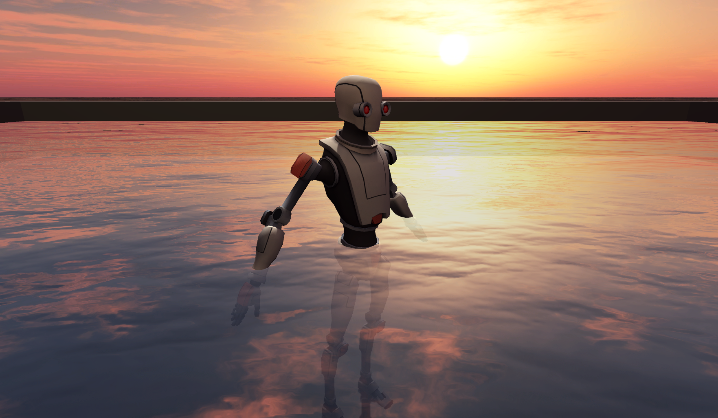
1
2
3
4
5
6
7
8
9
10
11
12
13
14
15
16
17
18
19
20
21
22
23
24
25
26
27
28
29
30
31
32
33
34
35
36
37
38
39
40
41
42
43
44
45
Shader "Rito/Water"
{
Properties
{
_BumpMap("Normal Map", 2D) = "bump" {}
_Cube("Cube", Cube) = ""{}
[Space]
_Alpha("Alpha", Range(0, 1)) = 0.8
_Tiling("Normal Tiling", Range(1, 10)) = 1
_Strength("Normal Strength", Range(0, 2)) = 1
}
SubShader
{
Tags { "RenderType"="Transparent" "Queue"="Transparent" }
CGPROGRAM
#pragma surface surf Lambert alpha:fade
#pragma target 3.0
sampler2D _BumpMap;
samplerCUBE _Cube;
struct Input
{
float2 uv_BumpMap;
float3 worldRefl;
INTERNAL_DATA
};
float _Alpha;
float _Tiling;
float _Strength;
void surf (Input IN, inout SurfaceOutput o)
{
float3 reflColor = texCUBE(_Cube, WorldReflectionVector(IN, o.Normal));
o.Normal = UnpackNormal(tex2D(_BumpMap, IN.uv_BumpMap * _Tiling)) * _Strength;
o.Emission = reflColor;
o.Alpha = _Alpha;
}
ENDCG
}
FallBack "Legacy Shaders/Transparent/VertexLit"
}
프레넬 공식 적용
프레넬 공식은 시야 방향 벡터와 대상의 노멀 방향 벡터의 관계를 이용한 공식이다.
두 벡터가 이루는 각이 수직에 가까울수록 투과율이 감소하고, 반사율이 증가한다는 것을 의미한다.
간단히 1 - saturate(dot(N, V))로 표현하며, 이를 다양하게 응용할 수 있다.

1
2
3
4
5
6
7
8
9
10
11
12
13
14
15
16
17
18
19
// Properties
_FresnelPower("Fresnel Power", Range(0, 10)) = 3
_FresnelIntensity("Fresnel Intensity", Range(0, 5)) = 1
// ...
void surf (Input IN, inout SurfaceOutput o)
{
float3 reflColor = texCUBE(_Cube, WorldReflectionVector(IN, o.Normal));
o.Normal = UnpackNormal(tex2D(_BumpMap, IN.uv_BumpMap * _Tiling)) * _Strength;
// Fresnel
float ndv = saturate(dot(normalize(o.Normal), IN.viewDir));
float fresnel = 1. - pow(ndv, _FresnelPower) * _FresnelIntensity;
o.Emission = reflColor * _CubeIntensity * fresnel + _CubeBrightness;
o.Alpha = _Alpha * (fresnel + _AlphaAdd);
}
물 흐르게 하기
물을 흐르게 하는 것은 정말 간단하다.
노멀 텍스쳐를 샘플링할 때 uv에 시간을 더해주면 된다.
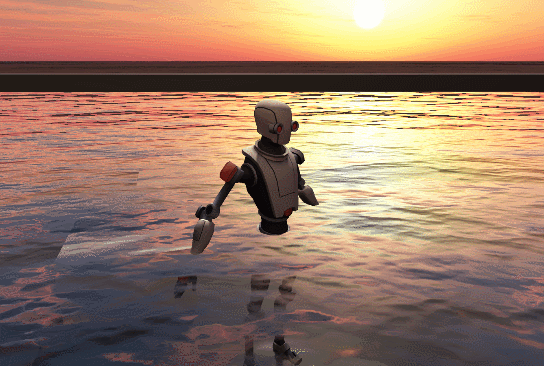
그런데 이렇게 하면 흐른다는 느낌보다 ‘지나간다’는 느낌이 강하다.
그래서 텍스쳐를 두 번 샘플링하여, 서로 반대 방향으로 흐르게 해주고 두 결과의 평균 값을 사용한다.
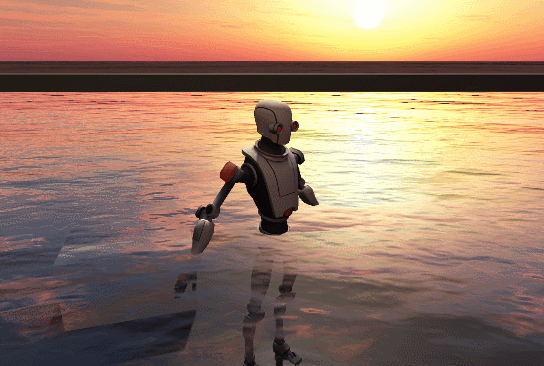
이제 정말로 물이 흐르는 듯한 느낌이 든다.
1
2
3
4
5
6
7
8
9
10
11
12
13
14
15
16
17
18
19
20
21
22
23
24
25
26
// Properties
_FlowDirX("Flow Direction X", Range(-1, 1)) = 1
_FlowDirY("Flow Direction Y", Range(-1, 1)) = 0
_FlowSpeed("Flow Speed", Range(0, 10)) = 1
// ...
void surf (Input IN, inout SurfaceOutput o)
{
// Flow
float2 flowDir = normalize(float2(_FlowDirX, _FlowDirY));
float2 flow = flowDir * _Time.x * _FlowSpeed;
float3 normal1 = UnpackNormal(tex2D(_BumpMap, IN.uv_BumpMap * _Tiling + flow)) * _Strength;
float3 normal2 = UnpackNormal(tex2D(_BumpMap, IN.uv_BumpMap * _Tiling - flow * 0.3)) * _Strength * 0.5;
float3 reflColor = texCUBE(_Cube, WorldReflectionVector(IN, o.Normal));
o.Normal = (normal1 + normal2) * 0.5;
// Fresnel
float ndv = saturate(dot(normalize(o.Normal), IN.viewDir));
float fresnel = 1. - pow(ndv, _FresnelPower) * _FresnelIntensity;
o.Emission = reflColor * _CubeIntensity * fresnel + _CubeBrightness;
o.Alpha = _Alpha * (fresnel + _AlphaAdd);
}
스페큘러 적용
스페큘러를 이용해 물 표면에 빛이 예쁘게 산란되도록 만들 수 있다.
기존에 사용하던 Lambert 대신, 커스텀 라이트 함수를 만들어 적용한다.
스페큘러는 저렴한 블린 퐁 공식을 사용하였다.
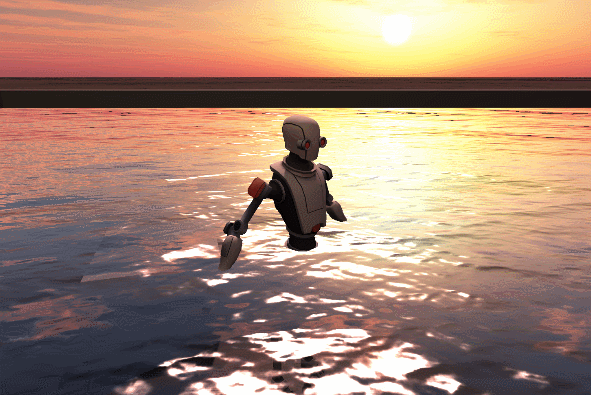
1
2
3
4
5
6
7
8
9
10
11
12
13
14
15
16
17
18
19
20
21
22
23
24
// Properties
_SpColor("Specular Color", Color) = (1, 1, 1, 1)
_SpPower("Specular Power", Range(10, 500)) = 150
_SpIntensity("Specular Intensity", Range(0, 10)) = 3
// ...
#pragma surface surf WaterSpecular alpha:fade
// ...
float4 LightingWaterSpecular(SurfaceOutput s, float3 lightDir, float3 viewDir, float atten)
{
float3 H = normalize(lightDir + viewDir); // Binn Phong
float spec = saturate(dot(H, s.Normal));
spec = pow(spec, _SpPower);
float4 col;
col.rgb = spec * _SpColor.rgb * _SpIntensity * _LightColor0;
col.a = s.Alpha + spec;
return col;
}
파도 만들기
거창한 파도는 아니고, 물이 더 역동적으로 일렁이게끔 하려고 한다.
우선 하나만 사용하던 Plane을 복제하여 4개로 만든다.
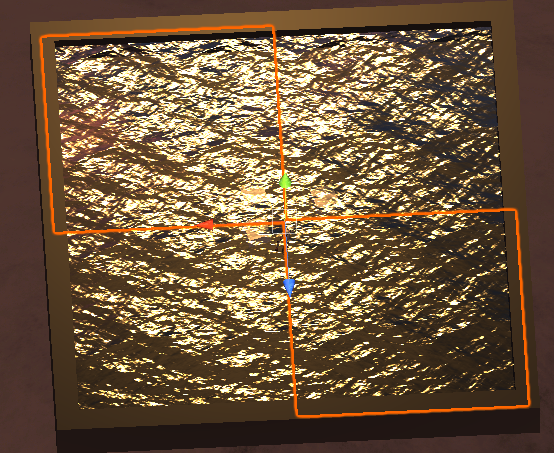
그리고 버텍스 함수를 추가하고, 정점 Y 위치를 uv.x만큼 더해준다.
1
2
3
4
5
6
#pragma surface surf WaterSpecular alpha:fade vertex:vert
void vert(inout appdata_full v)
{
v.vertex.y += v.texcoord.x;
}
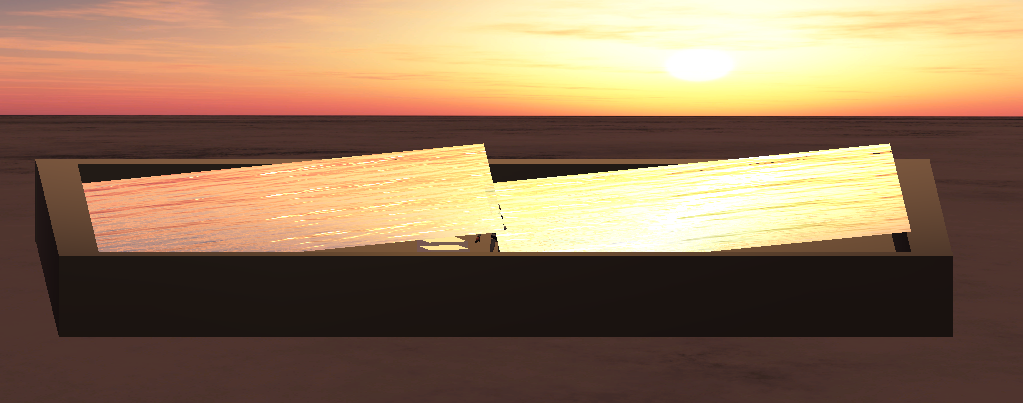
그럼 요렇게 경사가 생긴다.
이번에는 Plane끼리 연결시킬 목적으로 이렇게 수정한다.
1
v.vertex.y += abs(v.texcoord.x * 2. - 1.);
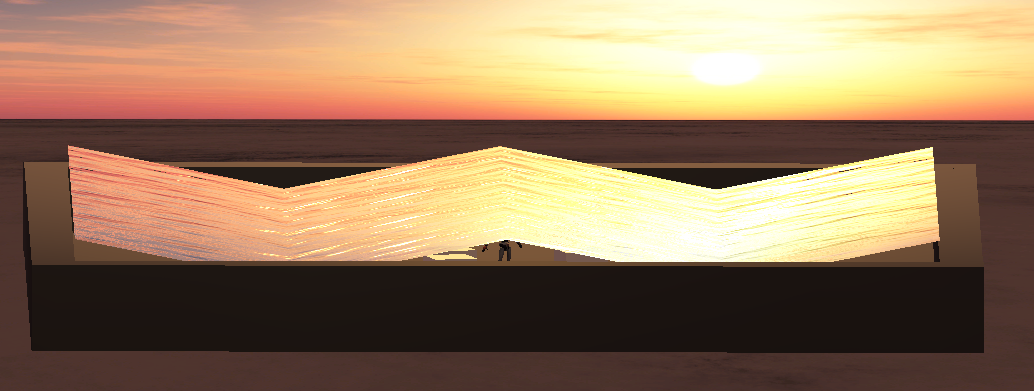
근데 곰곰이 생각해보니, 메시가 더 조밀한 Plane을 만들어 쓰거나 테셀레이션을 넣으면 굳이 번거롭게 Plane을 여러 장 붙여 쓸 필요가 없을 것 같다.
그래서 바로 만들어 왔다.
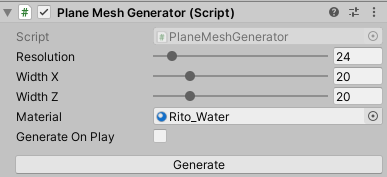
그리고 이번엔 프로퍼티를 넣어 각종 옵션들을 제어할 수 있게 해주고,
uv의 x와 y를 이용해 모든 방향으로 파도를 설정할 수 있게 해준다.
그리고 부드럽게 연결되도록 sin() 함수에 넣어준다.
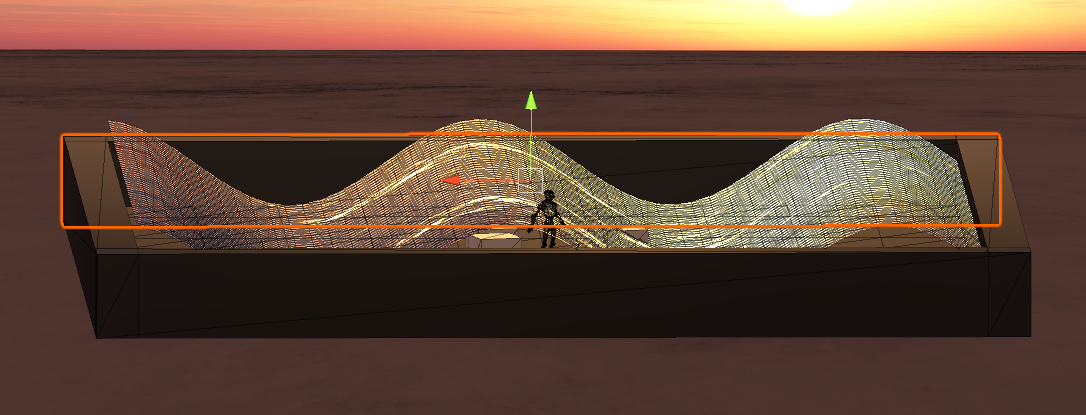
1
2
3
4
5
6
7
8
9
10
11
12
13
14
15
16
17
18
19
20
21
22
23
24
25
26
27
28
29
// Properties
_WaveCount("Wave Count", Int) = 0
_WaveHeight("WaveHeight", Range(0, 10)) = 1
_WaveDirX("Wave Direction X", Range(-1, 1)) = 0.5
_WaveDirY("Wave Direction Y", Range(-1, 1)) = 1
_WaveSpeed("Wave Speed", Range(0, 10)) = 1
// ...
#pragma surface surf WaterSpecular alpha:fade vertex:vert
// ...
float _WaveHeight, _WaveDirX, _WaveDirY, _WaveSpeed;
int _WaveCount;
void vert(inout appdata_full v)
{
float t = _Time.y * _WaveSpeed;
float2 waveDir = normalize(float2(_WaveDirX, _WaveDirY));
float wave;
wave = sin(abs(v.texcoord.x * waveDir.x) * _WaveCount + t) * _WaveHeight;
wave += sin(abs(v.texcoord.y * waveDir.y) * _WaveCount + t) * _WaveHeight;
v.vertex.y = wave / 2.;
}
// ...
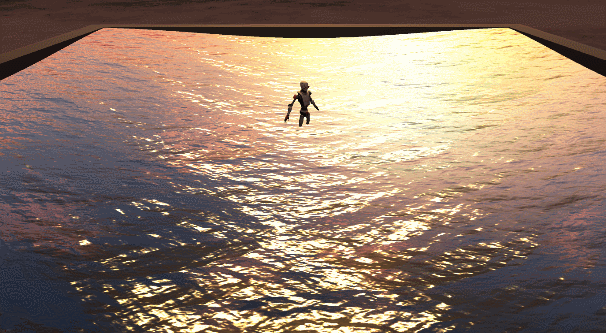
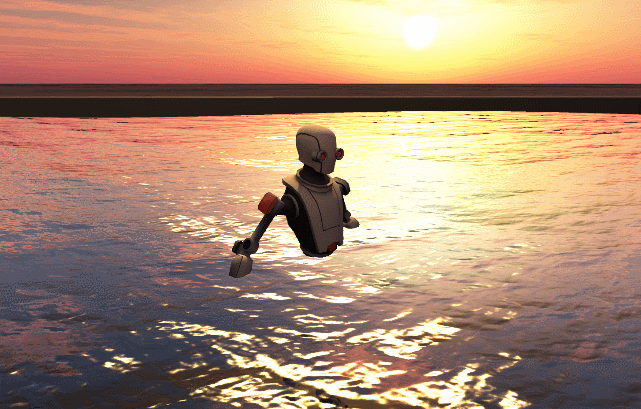
투과율 제어하기
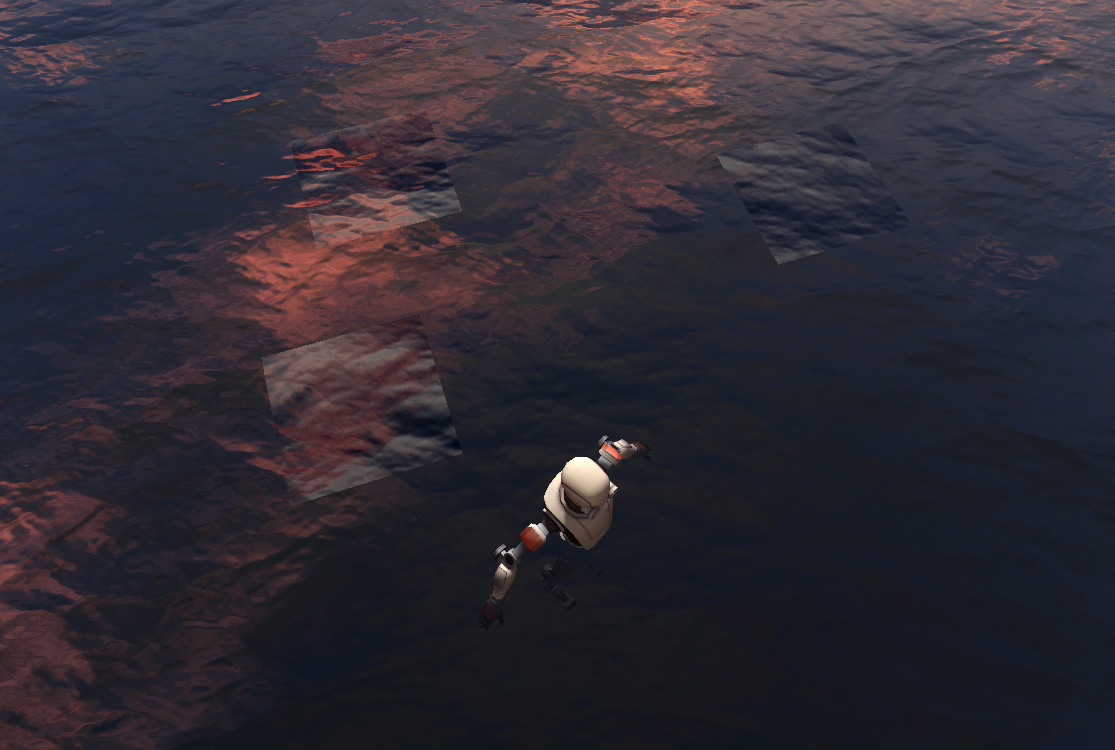
지금까지 노멀맵에 의해 분산된 노멀 값을 기반으로 투과율을 설정했더니, 의도와 전혀 다른 결과가 나왔다.
마치 물 표면에 오클루전이 자글자글하게 낀 것 같은 느낌이었다.
따라서 노멀맵 적용 이전의 노멀값과 뷰 벡터를 이용해 투과율을 제어하도록 변경하였다.
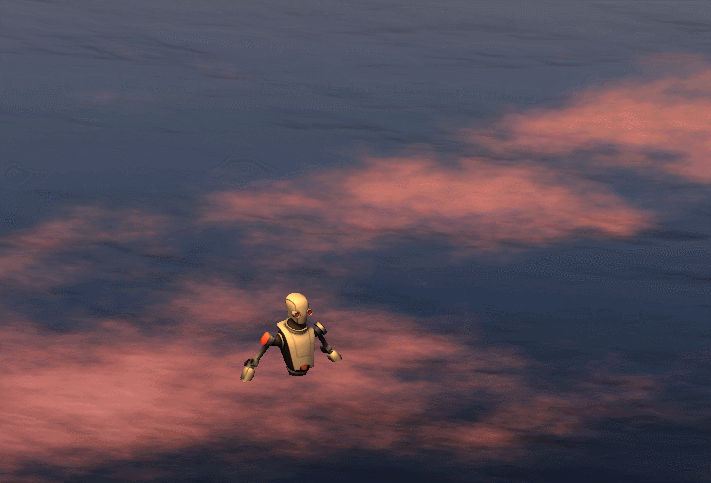
1
2
3
4
5
6
7
8
[Space, Header(Penetration Options)]
_Penetration("Penetration", Range(0, 1)) = 0.2 // 투과율
_PenetrationThreshold("Penetration Threshold", Range(0, 50)) = 5
/* surf 함수 */
// originNormal : 노멀맵 적용하지 않은 초기 노멀벡터
float penet = pow(saturate(dot(originNormal, IN.viewDir)), _PenetrationThreshold) * _Penetration;
o.Alpha = _Alpha - penet;
최종 결과
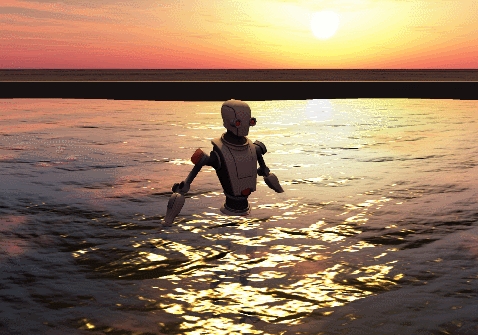
1
2
3
4
5
6
7
8
9
10
11
12
13
14
15
16
17
18
19
20
21
22
23
24
25
26
27
28
29
30
31
32
33
34
35
36
37
38
39
40
41
42
43
44
45
46
47
48
49
50
51
52
53
54
55
56
57
58
59
60
61
62
63
64
65
66
67
68
69
70
71
72
73
74
75
76
77
78
79
80
81
82
83
84
85
86
87
88
89
90
91
92
93
94
95
96
97
98
99
100
101
102
103
104
105
106
107
108
109
110
111
112
113
114
115
116
117
118
119
120
121
122
123
124
125
126
127
128
Shader "Rito/Water"
{
Properties
{
[Header(Textures)]
_BumpMap("Normal Map", 2D) = "bump" {}
_Cube("Cube", Cube) = ""{}
[Space, Header(Basic Options)]
_Tint("Tint Color", Color) = (0, 0, 0.01, 1)
_Alpha("Alpha", Range(0, 1)) = 1
_CubeIntensity("CubeMap Intensity", Range(0, 2)) = 1
_CubeBrightness("CubeMap Brightness", Range(-2, 2)) = 0
[Space, Header(Penetration Options)]
_Penetration("Penetration", Range(0, 1)) = 0.2 // 투과율
_PenetrationThreshold("Penetration Threshold", Range(0, 50)) = 5
[Space, Header(Normal Map Options)]
_Tiling("Normal Tiling", Range(1, 10)) = 2
_Strength("Normal Strength", Range(0, 2)) = 1
[Space, Header(Fresnel Options)]
_FresnelPower("Fresnel Power", Range(0, 10)) = 3
_FresnelIntensity("Fresnel Intensity", Range(0, 5)) = 1
[Space, Header(Lighting Options)]
_SpColor("Specular Color", Color) = (1, 1, 1, 1)
_SpPower("Specular Power", Range(10, 500)) = 300
_SpIntensity("Specular Intensity", Range(0, 10)) = 2
[Space, Header(Flow Options)]
_FlowDirX("Flow Direction X", Range(-1, 1)) = -1
_FlowDirY("Flow Direction Y", Range(-1, 1)) = 1
_FlowSpeed("Flow Speed", Range(0, 10)) = 1
[Space, Header(Wave Options)]
_WaveCount("Wave Count", Int) = 8
_WaveHeight("WaveHeight", Range(0, 10)) = 0.1
_WaveDirX("Wave Direction X", Range(-1, 1)) = -1
_WaveDirY("Wave Direction Y", Range(-1, 1)) = 1
_WaveSpeed("Wave Speed", Range(0, 10)) = 2
}
SubShader
{
Tags { "RenderType"="Transparent" "Queue"="Transparent" }
CGPROGRAM
#pragma surface surf WaterSpecular alpha:fade vertex:vert
#pragma target 3.0
sampler2D _BumpMap;
samplerCUBE _Cube;
struct Input
{
float2 uv_BumpMap;
float3 worldRefl;
float3 viewDir;
float3 Normal;
INTERNAL_DATA
};
float _Alpha, _Penetration, _PenetrationThreshold;
float _CubeIntensity, _CubeBrightness;
float _Tiling, _Strength;
float _FresnelPower, _FresnelIntensity;
float _FlowDirX, _FlowDirY, _FlowSpeed;
float4 _Tint, _SpColor;
float _SpPower, _SpIntensity, _DiffIntensity;
float _WaveHeight, _WaveDirX, _WaveDirY, _WaveSpeed;
int _WaveCount;
// Wave
void vert(inout appdata_full v)
{
float t = _Time.y * _WaveSpeed;
float2 waveDir = normalize(float2(_WaveDirX, _WaveDirY));
float wave;
wave = sin(abs(v.texcoord.x * waveDir.x) * _WaveCount + t) * _WaveHeight;
wave += sin(abs(v.texcoord.y * waveDir.y) * _WaveCount + t) * _WaveHeight;
v.vertex.y = wave / 2.;
}
void surf (Input IN, inout SurfaceOutput o)
{
float3 originNormal = o.Normal;
float3 reflColor = texCUBE(_Cube, WorldReflectionVector(IN, originNormal));
// Flow
float2 flowDir = normalize(float2(_FlowDirX, _FlowDirY));
float2 flow = flowDir * _Time.x * _FlowSpeed;
float3 normal1 = UnpackNormal(tex2D(_BumpMap, IN.uv_BumpMap * _Tiling + flow));
float3 normal2 = UnpackNormal(tex2D(_BumpMap, IN.uv_BumpMap * _Tiling * 0.5 - flow * 0.3)) * 0.5;
o.Normal = (normal1 + normal2) * 0.5;
// Fresnel
float ndv = saturate(dot(o.Normal * _Strength, IN.viewDir));
float fresnel = 1. - pow(ndv, _FresnelPower) * _FresnelIntensity;
// Penetration
float penet = pow(saturate(dot(originNormal, IN.viewDir)), _PenetrationThreshold) * _Penetration;
// FInal
o.Emission = (_Tint * 0.5) + (reflColor * _CubeIntensity * fresnel) + _CubeBrightness;
o.Alpha = _Alpha - penet;
}
float4 LightingWaterSpecular(SurfaceOutput s, float3 lightDir, float3 viewDir, float atten)
{
float3 H = normalize(lightDir + viewDir); // Binn Phong
float spec = saturate(dot(H, s.Normal));
spec = pow(spec, _SpPower);
float4 col;
col.rgb = spec * _SpColor.rgb * _SpIntensity * _LightColor0;
col.a = s.Alpha + spec;
return col;
}
ENDCG
}
FallBack "Legacy Shaders/Transparent/VertexLit"
}
References
- 정종필, 테크니컬 아티스트를 위한 유니티 쉐이더 스타트업, 비엘북스, 2017